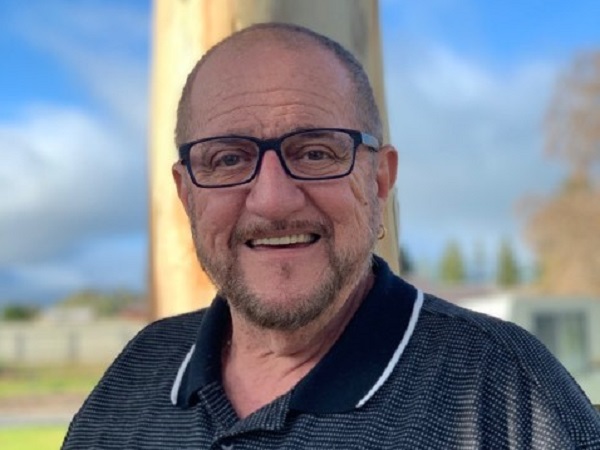
David ‘Tarnda’ Copley (DipAppSc(DevDis) ’88, BNg(GradEntry) ’08, GradDip(MentHlthNg) ’09), is an Aboriginal man of Kaurna and Peramangk descent, and a recognised Elder of the Kaurna Nation of South Australia. He has had a distinguished career as a nurse, researcher and advocate for Aboriginal health reform, especially in the areas of mental health, substance misuse and cancer.
David is a pioneering Aboriginal student with three qualifications from Flinders University. In 1988 he became the first Aboriginal person to obtain a Diploma of Applied Science (Developmental Disabilities) from the University.
‘My decision to go into Nursing and particularly Mental Health Nursing, was the lack of culturally appropriate health services available to Aboriginal and Torres Strait Islander people,’ says David who is now a voice for Aboriginal and Torres Strait Islander people.
At Flinders University’s College of Nursing and Health Sciences David works alongside Barkindji woman Nancy Bates as a ‘Malpa’ – a Warlpiri word meaning ‘friends on the journey’. Malpas serve as Aboriginal cultural tutors for nursing students and as cultural guides for academic staff at Flinders.
He says, ‘The most significant aspect of the role is to give students a cultural understanding – facts not myths – of Aboriginal Australians, the impact of colonization, both past and present, and the tools to work in a clinical setting in a manner that is both culturally safe and clinically sound.’
In 2012 David was a finalist for Nurse of the Year in the HESTA Australian Nursing and Midwifery Awards in recognition of his achievements at Quitskills where he helped to double the number of Indigenous clients calling the smoking Quitline.
He is a researcher at the Menzies School of Health Research at Charles Darwin University, where he chairs the Indigenous Reference Group. He has also served on the Advisory Board for the Menzies School’s Indigenous cancer research centre, DISCOVER-TT Centre of Research Excellence.
David, who survived stage three bowel cancer more than a decade ago, says he initially became involved in Aboriginal cancer research by chance, ‘however, the more I became involved, the more I saw the need for education and change.’
David is currently working on the design and implementation of an Aboriginal and Torres Strait Islander culturally appropriate bowel screening kit and researching the impact that families and people in communities face when someone is diagnosed with cancer.
‘Unfortunately cancer survival in Aboriginal and Torres Strait Islander communities is still low and therefore not a topic for discussion, particularly with men as they see the diagnosis as a death sentence.
‘I am an Ambassador for The National Indigenous Cancer Network and together with other Aboriginal and Torres Strait Islander based research groups, we are starting to make a difference through education, research and training.’
David is in no doubt about the need for sustained systemic change to close the Aboriginal and Torres Strait Islander health gap.
‘I would like to be able to say we are Closing the Gap on Aboriginal and Torres Strait Islander health, but the truth is we are not! In the Prime Minister’s 2020 Closing the Gap Report it showed that the Australian Government was actually failing in this area. I believe there are two main reasons for this failure: governments don’t consult with Aboriginal communities on their health needs; and we don’t have enough trained Aboriginal and Torres Strait Islander health professionals.’

